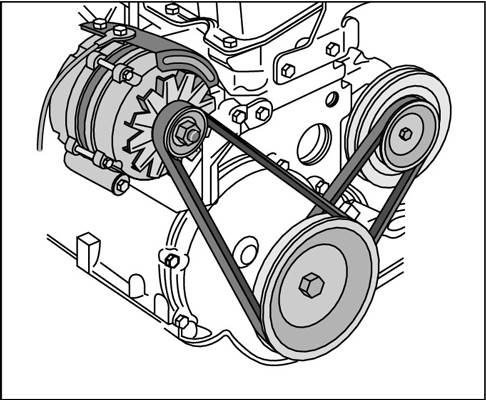Many cars have accessory belts that drive the alternator, the power-steering pump, the air conditioning compressor, the water pump in many cases, and other parts of a modern vehicle. Newer cars have a Serpentine multi-accessory drive belt, as shown here.
If you drive an older car, you have to check the separate belts, as shown here.
If you can’t get to an accessory belt easily to check it yourself, have it checked when you have the vehicle serviced or if the belt gets noisy or any of the equipment it drives begins to malfunction.
It isn’t easy to figure out whether a belt is at the right tension just by looking at it, and often it’s obscured by a shield or cowling. If the belt is loose, you’ll hear squeaky noises when you accelerate sharply. With the hood up, the gearshift in Park or Neutral, and the parking brake on, have a friend accelerate the engine while you listen. Be sure to keep your hair and clothing away from the belt.
Because tensioners are spring-loaded, they can be unsafe to deal with yourself. Check your owner’s manual or a service manual for your vehicle’s make, model, and year to see what’s involved in adjusting your accessory belt. If you can’t reach the adjusting mechanism without removing other parts, if adjusting the belt requires special tools, or if it looks as though releasing the tension may be risky, you should have a professional deal with it.
If you can see an accessory belt easily, here’s what to look for:
If the belt “gives” more than 1/2 inch when you press on it but otherwise is in good condition, it may just need to be adjusted.
If the belt is glazed or has oil on it, the slick surface will slip where it winds around the pulleys and it won’t be able to efficiently drive the components connected to it. Your engine may overheat because the water pump isn’t operating properly, or the air conditioner may fail to cool the interior of your vehicle. Have the belt replaced.
If you see chunks missing from the belt or many cracks across its surface, or if it’s frayed or tearing, debris may be embedded in it, or one of the pulleys may be out of alignment. The safest move is to replace the belt.
If the belt squeaks, it may have been contaminated by water, coolant, oil, or another fluid. If it’s just water, check around the water pump and the hoses to see where the leak is, and eliminate the cause of the leak. The water will dry up on its own. The belt needs to be replaced if the contaminant is coolant, oil, power-steering fluid, or some other substance or if the belt has broken, is frayed, or have large cracks or pieces missing.

How to Check a Vehicle’s Accessory Belts
by
Tags:

Leave a Reply